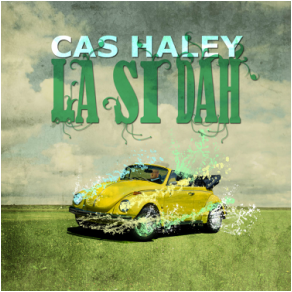
Cas Haley recorded albums but could never stomach listening to the final product. His songs sounded too perfect, too produced and lacked purity.
Then Haley met producer and engineer Rob Fraboni, who is well known for his work with Bob Dylan, The Band, Eric Clapton and The Rolling Stones, and a reawakening occurred.
Fraboni helped the runner-up from Season 2 of America’s Got Talent make an honest album: LA SI DAH.
“He helped me accept myself,” said the 32-year-old Haley “and realize how great all the little flaws are and that’s what gives something a vibe.”
Haley spoke with jambands.com from his Paris, Texas home before embarking on his summer tour. His touring band consists of organist Ryan Eldridge, bassist Eric Neal and drummer Frank Moka.
In the fall, Haley will perform at Yonder Mountain String Band’s Harvest Music Festival, Ozark, AR.
In the liner notes for LA SI DAH, you wrote that “this album is my attempt find the spirit of music.” Can you explain.
It’s the most honest reflection. Eighty percent of the album is completely live and all the other stuff was cut in a live fashion. We recorded it in one room, minimal mics, no isolation, no headphones. It’s the first album that I’ve accepted my limitations and accepted me and I’m OK with it. The past albums that I’ve done, I always had a pure heart, but I was obsessed with getting everything perfect. It gets soulless and vibeless when everything is perfect. This album is a true honest reflection of what we did that day and I never did that before.
What did you learn from working with Fraboni?
He taught me one of the most important things that I’ve learned about music up until this point: That it’s not about what you’re playing but how you’re feeling when you’re playing it – that’s what really translates. Just an action is not creative but an emotion with an action is something creative and makes it art. It’s that invisible energy behind it that makes it special. He really taught me about art and what translates on recordings and what’s important. He’s an iconic dude and a real scientist. He’s the type of engineer and producer that’s there to capture the sound and emotion as opposed to manipulating it. He tries to capture artists in a pure, whole way.
Are there specific tracks that you’re really proud of?
I’m really excited about the instrumental aspect of the album. There are three instrumentals and I feel like those tracks give the album a breath of fresh of air. You don’t have the same guy talking to you through the whole time and that’s if people still listen to albums. Personally, I’m an album listener. When I buy an album, I listen to the whole thing front to back.
Being from Northeast Texas, how did you get into reggae?
I grew up in a super musical family. My mom and dad always had a band and always had friends over jamming. It was obvious to me that was what I wanted to do. I’d watch my dad do it and I fell in love with it really young – that was probably around 1992, when I was 12, and at the same time skateboard culture was a big part of what I was into and movies like Gleaming The Cube. And that sort of led into me getting into punk and punk rock ended up opening my eyes up to reggae and ska. And my mom for a time listened to a lot of Bob Marley and Jimmy Cliff.


No Comments comments associated with this post